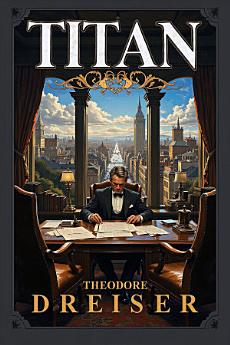The Titan
About this ebook
Set in the late 19th century, The Titan explores the cutthroat world of capitalism, urban development, and the moral compromises required to achieve success in a rapidly industrializing America. Cowperwood’s character is both fascinating and flawed—a man of immense intelligence and vision, yet morally ambiguous and driven by an insatiable desire for control. His ventures into streetcar monopolies, gas companies, and real estate reveal the darker side of ambition, as he manipulates, bribes, and outmaneuvers his rivals to secure his position.
Dreiser’s meticulous attention to detail and his unflinching portrayal of Cowperwood’s rise to power provide a vivid depiction of the era’s economic and social dynamics. The novel delves into the complexities of human nature, examining themes of greed, corruption, and the cost of success. Cowperwood’s personal life is equally tumultuous, marked by his tumultuous relationships with women, including his long-suffering wife and his various mistresses. These relationships highlight his emotional detachment and his single-minded focus on his ambitions.
Through Cowperwood’s story, Dreiser offers a critique of the American Dream, questioning whether true fulfillment can ever be achieved through material success alone. The novel’s rich character development and intricate plot make it a compelling exploration of the human condition, as well as a powerful commentary on the societal forces that shape individual destinies.
The Titan is a masterful blend of psychological depth, social commentary, and narrative tension. Dreiser’s realistic portrayal of Cowperwood’s world—both its opulence and its moral decay—creates a timeless story that resonates with readers today. It is a thought-provoking examination of ambition, power, and the price of greatness, solidifying Dreiser’s reputation as one of America’s foremost literary realists.
A must-read for fans of classic literature, The Titan continues to captivate and challenge readers with its unflinching exploration of the human spirit.
About the author
Theodore Dreiser (1871–1945) was an influential American novelist and journalist, widely regarded as one of the leading figures of literary naturalism. His works, characterized by their stark realism and exploration of social issues, challenged the moral and cultural norms of early 20th-century America. Dreiser’s writing often focused on the struggles of individuals against societal forces, emphasizing the role of environment, chance, and economic pressures in shaping human destiny.
Born in Terre Haute, Indiana, Dreiser grew up in a large, impoverished family. His early experiences with poverty and hardship deeply influenced his worldview and literary themes. After a brief stint at Indiana University, he worked as a journalist, which honed his observational skills and exposed him to the stark realities of urban life. These experiences laid the foundation for his later novels, which often depicted the struggles of ordinary people striving for success in an indifferent world.
Dreiser’s debut novel, Sister Carrie (1900), marked a turning point in American literature. The story of Carrie Meeber, a young woman who rises from poverty to fame while navigating morally ambiguous choices, was controversial for its time. Critics initially rejected the novel for its frank portrayal of relationships and its critique of conventional morality. However, it has since been recognized as a groundbreaking work that paved the way for modern American fiction. Dreiser’s naturalistic approach, which presented characters as products of their environment rather than masters of their fate, was revolutionary.
In 1925, Dreiser published An American Tragedy, his most acclaimed work. The novel, based on a real-life murder case, explores the dark side of the American Dream through the story of Clyde Griffiths, a young man whose ambition leads to his downfall. The book’s exploration of class, ambition, and moral ambiguity solidified Dreiser’s reputation as a master of naturalism.










